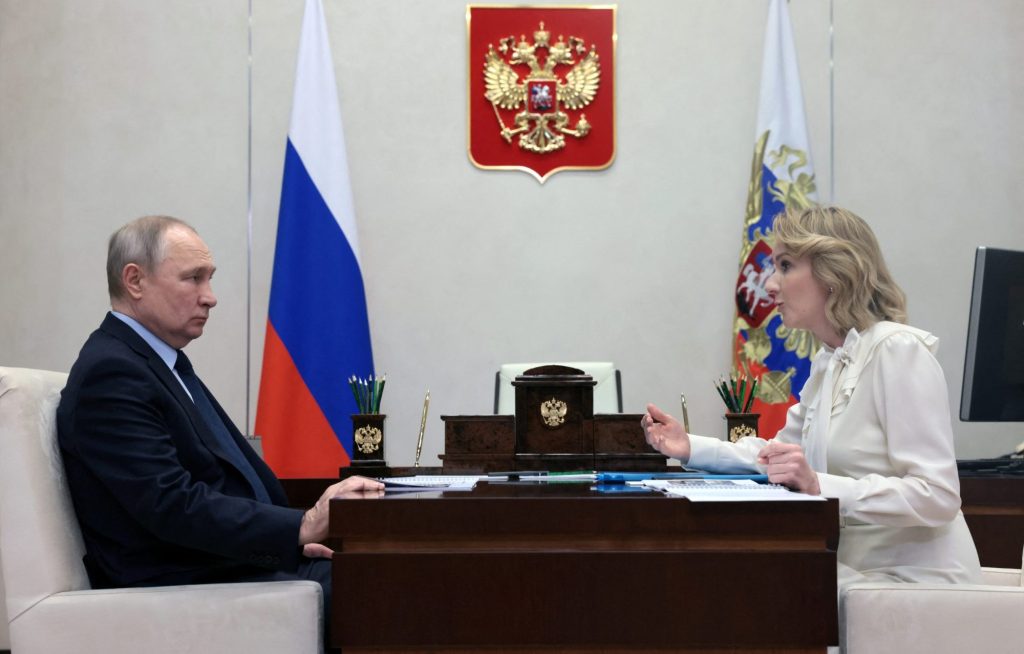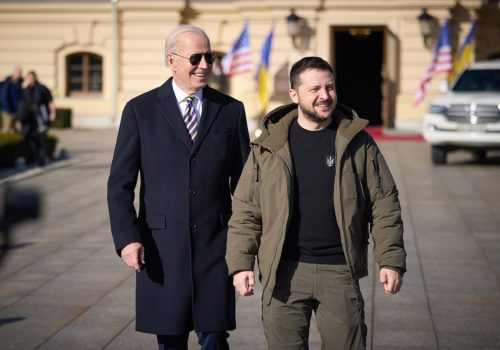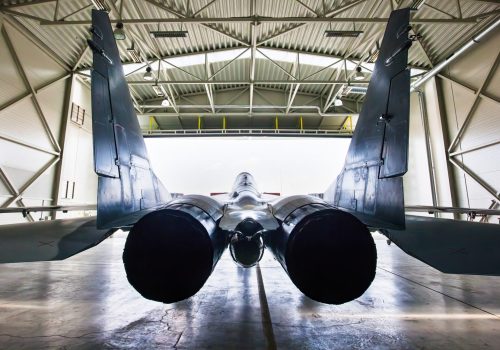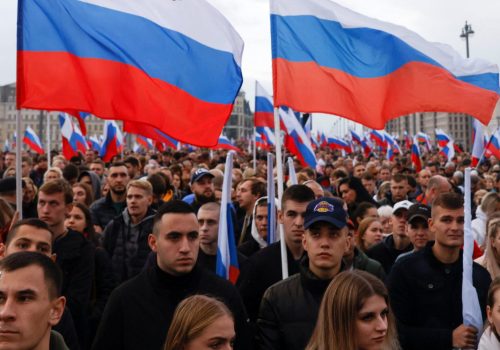The International Criminal Court (ICC) decision to issue an arrest warrant for Vladimir Putin over his alleged role in the deportation of Ukrainian children has sparked a lively debate. Is the move truly historic or merely symbolic?
By pointing the finger directly at Putin, the ICC has created an extraordinary opportunity to bolster its own legitimacy, build further solidarity in support of Ukraine, and permanently undermine Russia’s world-altering imperialist drive. However, to bring this to fruition without actually getting Putin in the dock, the international community must be careful to put Ukrainians themselves at the very center of their efforts to achieve justice.
When the ICC was established in 2002, it was a watershed moment in human history. Never before had so many states come together to accept the jurisdiction of a permanent international court over their territories, a “court of last resort” meant to try only the most heinous of crimes.
Unfortunately, the ICC’s poor conviction record and its tendency to focus almost entirely on African countries has led to disaffection and undermined its legitimacy. This is why it is so significant that although Putin is only the third sitting head of state to be indicted by the ICC for war crimes, he is the first leader of a major power.
This is also why it matters that in the Ukraine case, the ICC received the largest ever state party referral to open an investigation. This unprecedented show of international resolve has the potential to revive the court’s authority. If states continue to provide it with the necessary logistical and material support, perhaps the ICC can begin to live up to its lofty aspirations to end impunity for atrocity crimes.
Stay updated
As the world watches the Russian invasion of Ukraine unfold, UkraineAlert delivers the best Atlantic Council expert insight and analysis on Ukraine twice a week directly to your inbox.
It is also important that the ICC chose to make the warrants public instead of keeping them sealed. It did so because “the conduct addressed in the present situation is allegedly ongoing, and public awareness of the warrants may contribute to the prevention of the further commission of crimes.”
In other words, if not even Putin himself can escape the court’s notice, Russian soldiers all the way down the chain of command should also not expect to get away with war crimes. While there is unfortunately little evidence to suggest that international justice mechanisms like the ICC have been effective in deterring future atrocities, this does not mean that the ICC’s decision to name and shame Putin won’t have other important deterrent effects.
Perhaps most significantly, the warrant permanently isolates Putin and spells doom for lingering efforts to resume “business as usual” with today’s Russia. While some critics allege that the ICC warrant will provoke the accused and escalate conflict, the fact is that Putin has already become radicalized beyond redemption and was unlikely to show restraint in Ukraine anyway. Because the ICC’s warrant has no statute of limitations, either Putin will stand trial or the threat of it will haunt him until the end of his days.
Unless Putin is held accountable or loses power, there can never again be normalized relations with Russia. This signals to the many countries, particularly in the Global South but also in Europe, who have continued to hedge their bets over the war, that there is little point in doing so unless they want to risk their own reputations on the world stage. It also eliminates any diplomatic leverage Putin may have had in a peace process, because the ICC has made it clear that without accountability all the way to the very top, there can be no peace at all.
What remains unclear is how the ICC’s move will impact the thinking of the Russian elite, whose loyalty is critical for Putin’s survival. Many are hopeful, such as Ukrainian presidential advisor Mykhailo Podolyak, who described the warrants as “the beginning of the end for the Russian Federation in its current form on the world stage.”
The ICC’s high degree of scrutiny and willingness to go straight for Russia’s biggest fish may certainly make some of Putin’s supporters think twice, which could undermine the current regime and ultimately incentivize a future Russian government to hand the dictator over to The Hague. This is not beyond the realm of possibility. Indeed, it has already happened before with Slobodan Milosevic of the former Yugoslavia and Charles Taylor of Liberia. While it was once unimaginable that these war criminals would ever be handed over, they were both eventually extradited by their successors.
Eurasia Center events

Although it is impossible to predict, most observers agree that regime change is unlikely to happen anytime soon in Russia. It is therefore reasonable to assume that Putin is safe for now. Indeed, there is good reason to expect him to cling even harder to power, precisely to avoid the possibility that any successor would hand him over to the ICC. It is also worth remembering that Putin has successfully nurtured a revisionist, imperial mindset in the country and has made the Russian media heavily complicit in his crimes. This makes the possibility of a peaceful change of power something of a pipe dream.
Herein lies the main problem for those who long to see Putin in the dock. Russia is not a party to the Rome Statute, which established the ICC. In theory, if Putin sets foot in any one of the 123 countries which have ratified the Rome Statute, he would have to be arrested and sent straight to The Hague. Unfortunately, as the case of former Sudanese president Omar al-Bashir shows, states cannot always be counted on to live up to this obligation.
With this in mind, what can the ICC and the wider international community do to ensure the warrant for Putin’s arrest becomes a genuine step towards meaningful justice? The ICC has an important role to play outside of the courtroom, but it needs the logistical and material support to live up to it. While the Court documents atrocities and gives them a permanent place in the public record, it should also give victims a sense of ownership over the process by facilitating their participation in the trials themselves and through its own outreach to affected communities.
Given the unlikelihood of Ukrainians seeing Putin stand trial, it will be critical for the court and its supporters to nevertheless manage expectations and communicate what is happening and why the process still matters. The court must also work in partnership with Ukrainian civil society, without whom such extensive evidence on child deportations could never have been collected and acted upon in real time.
In this sense, it is crucial to remember that the ICC is meant to complement, not replace, Ukraine’s own judicial system in how it handles war crimes on its own territory. Ukraine’s courts are already overwhelmed by the size of the caseload, which only continues to grow. The international community must do everything it can to support Ukraine’s capacity to investigate and prosecute war crimes in a fair and impartial manner.
The international community should also create a broader framework in which to pursue justice and accountability. One immediate step is to establish clear mechanisms to help locate, trace, and reunite all separated Ukrainian children with their families and legal guardians. This means supporting Ukrainian civil society activists who not only facilitate family reunification but stand ready to provide the vast array of services Ukrainians will need for years to come in order to recover from the horrors of the war. Even when peace and the rule of law are restored in Ukraine, much will depend on how well the country can pursue a holistic, comprehensive form of justice.
To come full circle back to the question of whether the ICC’s arrest warrant for Putin is indeed “historic,” a cynical read would be that this moment ultimately highlights the most important gap in international law when it comes to Russia’s crimes in Ukraine. It remains impossible for the ICC to prosecute the crime of aggression if the states in question are not parties to the Rome Statute. Until there is a viable international mechanism to prosecute aggression and the collective political will to do so, the root causes of this war can never be fully addressed, rule of law will never be fully restored, and impunity will continue.
Danielle Johnson holds a PhD in Politics from Oxford University and is currently a Senior Ukraine Analyst at ACAPS.
Further reading
The views expressed in UkraineAlert are solely those of the authors and do not necessarily reflect the views of the Atlantic Council, its staff, or its supporters.

The Eurasia Center’s mission is to enhance transatlantic cooperation in promoting stability, democratic values and prosperity in Eurasia, from Eastern Europe and Turkey in the West to the Caucasus, Russia and Central Asia in the East.
Follow us on social media
and support our work
Image: Russian President Vladimir Putin meets with Russian Presidential Commissioner for Children's Rights Maria Lvova-Belova at the Novo-Ogaryovo state residence outside Moscow. February 16, 2023. (Sputnik/Mikhail Metzel/Pool via REUTERS)




